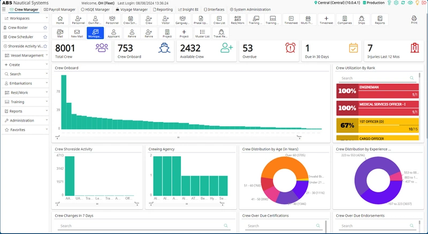Reduced budget appropriations made by the Clinton Administration may put the future of the Maritime Guaranteed Loan Program at risk
By David Gilmore
On October 1, 1993, President Clinton announced his shipyard initiative, a five-part plan to assist shipyards in transitioning from their primary role as builders of Jones Act vessels and U.S. Navy ships in support of the Cold War to internationally competitive shipyards capable of building ships for a wide variety of uses.
A cornerstone of this plan is the Maritime Guaranteed Loan Program, commonly referred to as the Title XI Program. The President's shipyard initiative revitalized the important role of the Title XI Program in helping to maintain a fleet of vessels able to engage in the coastwise or Jones Act trade and maintaining our shipyards.
Unfortunately, the appropriation that the Clinton Administration has proposed with the fiscal year 2001 budget calls the future of the plan into question and risks the continuing viability of the Title XI Program.
The Title XI Program, created in 1938, is a component of the Merchant Marine Act of 1936, as amended, and, as its name implies, provides for a full faith and credit guarantee by the U.S. government for private sector financing of the construction or reconstruction of U.S. and foreign-flagged vessels, provided the work is done by U.S. shipyards, and of the construction or modernization of U.S. shipyards. Aside from a determination by the Maritime Administration that a project be economically sound, there are two factors which play a role in deciding whether or not a project is approved for guarantee by the U.S. government: (i) the annual cap of $1 billion on the amount of financing it may guarantee under the Title XI Program and (ii) the amount of funds allocated to the Title XI Program in the federal budget.
While the amount of guarantees approved from year to year varies, the average loan guarantee level is approximately $971 million annually. Thus, the cap on the amount of financing guaranteed under the program has not been a factor in limiting the number of projects approved by the Maritime Administration. Furthermore, the Administration has proposed eliminating the annual cap altogether in its fiscal year 2001 budget.
The Federal Credit Reform Act of 1990 mandates that the federal budget include funds to cover the estimated long-term costs of the guarantees to the U.S. government in the event of a default on that guaranteed debt. These estimated long-term costs are based on economic soundness determinations and risk assessments for the project and average about 5% of the guaranteed amount of each project. Based on this average estimated cost Congress must appropriate approximately $5 million for every $100 million in financing projects that the Maritime Administration guarantees.
The funds appropriated for the Title XI Program are different from the typical agency appropriation in that they are not "expended." Once the guarantees for a project are issued, the funds are transferred from one line on the U.S. government's balance sheet to another, but they remain in the U.S. Treasury, as a reserve, until and unless a default on a guaranteed obligation occurs. Furthermore, if the Maritime Administration does not use all of the funds appropriated to it to cover the long-term costs of the U.S. government guarantees, the funds are carried over into the succeeding fiscal years until they are used. As of the beginning of the fiscal year 2000, the Maritime Administration had approximately $77 million remaining from prior appropriations for the Title XI Program.
The increasing levels of Title XI loan guarantees issued since 1996 testify that once the availability of Title XI guarantees under the President's initiative worked its way into new projects, President's initiative was an enormous success. Considering this upward trend and the unprecedented interest the program has received, it is problematic that the amount of funds allocated to the program has declined significantly in the latter part of the 1990s. The Administration's budget requests only $2 million, an appropriation, which would cover only $40 million in loan guarantees in fiscal year 2001. The decreasing funding undermines the role Title XI plays in the 1993 shipyard initiative and hinders the ability of U.S.-flag carriers to replace many of their aging vessels and for U.S. shipyards to modernize at a critical time.
U.S.-flag carriers need to be able to replace existing tonnage and expand their fleets if they are to continue to comply with the requirements of OPA '90 and if they wish to share in the shipment of goods and materials in the ever increasing U.S. and international trade. U.S. shipyards need to be able to renovate or modernize their facilities to promote efficiencies and to increase their ability to compete internationally for new ship construction. This declining funding also goes against the increase in project costs reflected in applications for Title XI loan guarantees.
Any argument that the proposed appropriation is sufficient to carry the Title XI Program through fiscal year 2001 ignores several important facts: 1) as of February 23, 2000, there were applications pending for guarantees for $3.4 billion in financing on 79 ships, with more arriving every month; 2) based on the Maritime Administration's average long-term cost estimate of 4.97% for fiscal year 2001, the $3.75 million in funds remaining at the end of fiscal year 2000 will prevent it from approving all but a very small fraction of the over $1.43 billion in guarantees that will still be pending; and 3) the Maritime Administration has annually approved an average of $971 million in loan guarantees over the past 4 years.
Considering the high level of interest by U.S. shipowners in the Title XI Program and the increased cost of the projects that many of those shipowners are facing, an allocation of $2 million is clearly insufficient to continue the program through the next fiscal year. In fact, 54 members of the House and Senate have requested that the appropriation in the 2001 budget be increased to $50 million, a level many believe would be sufficient to allow economically sound applications for Title XI loan guarantees to be funded once approved by the Maritime Administration. An appropriation of only $2 million would deprive the Title XI Program of needed funds to continue and solidify the successful expansion of the U.S. commercial shipbuilding and would be a sure sign that the federal government's interest in maintaining the viability of the Title XI has passed and U.S. shipowners will be faced with the problem of securing future private financing alone.
David Gilmore is an attorney with the Maritime Finance Group at Preston Gates Ellis & Rouvelas Meeds LLP in Washington, DC. For more information on this subject you may contact him at (202) 661-3819 or [email protected].
Featured videos

Taking the First Step Toward Autonomy

Send in the Drones (to deep, dark, confined maritime spaces)
October 2024
 Read the Magazine
Read the Magazine

 Read the Magazine
Read the Magazine
This issue sponsored by:

Cyber Threats to Maritime Vessels Grow Exponentially
Subscribe for
Maritime Reporter E-News
Maritime Reporter E-News is the maritime industry's largest circulation and most authoritative ENews Service, delivered to your Email five times per week









